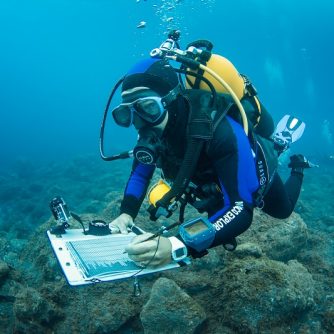The twilight of nature
- Home
- Actualités
- IPBES Biodiversity Report: Twilight on Nature
On May 6, the Intergovernmental Panel on Biodiversity and Ecosystem Services (IPBES) released an alarming report on the global state of biodiversity…
In 2011, the United Nations Decade for Biodiversity began, with ambitious targets for improvement by 2020. With a year to go before the end of the decade, who remembers it existed? Who can be pleased with the successes achieved?
The preservation of 10% of the ocean by Marine Protected Areas will not be achieved. However, it is certainly in this area that the best progress of the decade has been observed. For the rest, the assessment of biodiversity and ecosystem services coordinated by 149 international experts of the IPBES is particularly cruel. This work, unanimously validated by the representatives of 110 countries, cannot be criticized for its lack of seriousness. And, if we are to believe the experience of the IPCC, which is the model for IPBES 20 years in advance, successive reports gain in precision but never in optimism.
The ocean has not been spared
As late as 1950, Rachel Carson wrote in This Sea That Surrounds Us, ” [L’Homme] cannot dominate or modify the oceans in the same way that it was able to reduce and plunder the continents during its still brief occupation. “Today, if 75% of terrestrial environments are “significantly altered”, 66% of marine environments are subject to “increasingly cumulative effects”.
On land, the consumption of natural areas and their fragmentation are the main causes of biodiversity loss and reduce the scope for adaptation to climate change. In the sea, fish retain the ability to migrate to escape the continued warming of the ocean. Bony fish seem to be the least vulnerable today.
However, overfishing remains massive on an ocean-wide scale and is only getting worse. One third of stocks are now being exploited beyond natural renewal, thus “eating into” the natural capital.
Fishing is now one of the most globalized activities. As stocks have been depleted, industrial fishing, supported by unsustainable subsidies, has moved away from the centres of consumption to the high seas, the deep sea and the poles.
INEQUALITIES AND CONFLICTS
Artisanal fishing, which supports 90% of the world’s fishermen with only half the catch, is largely practiced in the tropical belt. However, in addition to overfishing, the latter is doubly a victim of climate change: fish are leaving this area, which has become too hot, to migrate to temperate regions, and coral reefs are in the front line of “heat waves”. The surface area of reefs has been halved since 1870 and species diversity is eroding rapidly: 33% of coral species are now threatened. However, it is precisely this diversity that creates the geometric complexity of the reefs that allows the reproduction and growth of the fish.
This is a glaring example of the injustices of biodiversity: temperate countries, which were the first to exceed the limits of fishing and CO2 emissions, could be the winners in the coming mess!
Similarly, while biodiversity is declining at a slower rate in areas managed by indigenous communities, the new race for resources is increasing the pressure on them, promising social as well as environmental disaster.
The IPBES report also analyses the very unfair nature of the erosion of biodiversity, while the consumption of certain parts of the world is degrading the environment at a distance. It also stresses that these inequalities “fuel social instability and conflict”, while “more than 2,500 ongoing conflicts” are linked to access to certain resources.
We can therefore only welcome France’s intention to devote the G7 Environment Summit, which ended on 6 May, to “combating inequalities by protecting biodiversity and the climate”. It remains to be seen whether action can be taken, in an international context that is not currently conducive to such a collective commitment.
In terms of biodiversity as in climate, there is no doubt that our planet has been much worse off over the last few million years but, as the IPBES report points out, degradation has never been so rapid since the emergence of the human species. As for the variations that man has previously experienced, they have affected a few million individuals and not ten billion. And in those days, borders did not exist. Will Man be caught in his own fragmentation?
Speeding up, but in which direction?
It is true that human society has never been so developed or so fast in its evolution. The IPBES report went around the world in a few hours. Everyone can take the measure of the situation and invent solutions.
However, just as computers have not eliminated paper and telecommunications have not eliminated air travel, the technological evolution of society has not so far been conducive to slowing the erosion of biodiversity. On the contrary. As living standards have risen, so has resource consumption, in addition to rapid population growth. Individual consumption of seafood products has doubled over the last fifty years in the global race for animal protein.
“Technology” in itself cannot therefore be an answer, and our history for at least two centuries has tended to consolidate and crystallize a model of unbridled consumption that is eroding the “fundamentals” of our planet, the services that IPBES has highlighted: while widespread overfishing has led to a gentle decline in the quantities fished over the past two decades, the disappearance of pollinating insects will soon affect agricultural crops.
IPBES advocates rapid “transformative change” at all scales simultaneously, from local to global. However, in order to obtain the unanimity necessary for the approval of the report, it is careful not to specify the solutions that will make up this overall change. And preserving biodiversity is an even more complex challenge than climate change, which is only one component…
CHANGING THE WORLD
IPBES makes explicit “Transformative change is defined as fundamental system-wide change that takes into account technological, economic and social factors, including paradigms, goals and values.”
While assembling a vast toolbox of identified intervention tools, IPBES emphasizes the depth of change required: “While current structures often distract from sustainable development and are the indirect mechanisms of biodiversity loss, deep, structural change is needed. By its nature, transformative change will meet opposition from those with a vested interest in the status quo, but this opposition can be overcome in the public interest.”
Therefore, the signals that govern our society must be redesigned, through “incentives for environmental responsibility and the elimination of harmful incentives”.
To use the road safety slogan, we are “All responsible”. But who is ready to lift their foot off the gas, which government is ready to put in place speed cameras when we know that we are all going into the wall at high speed?









